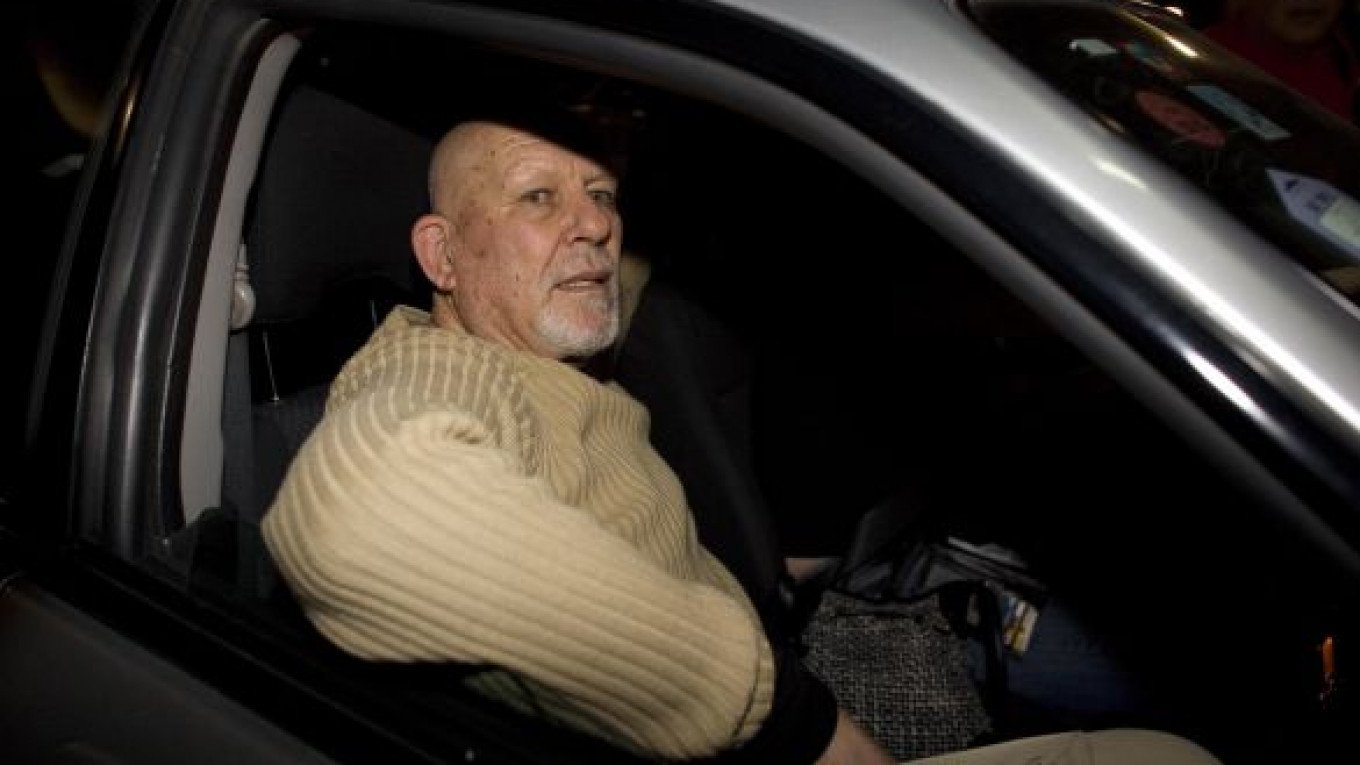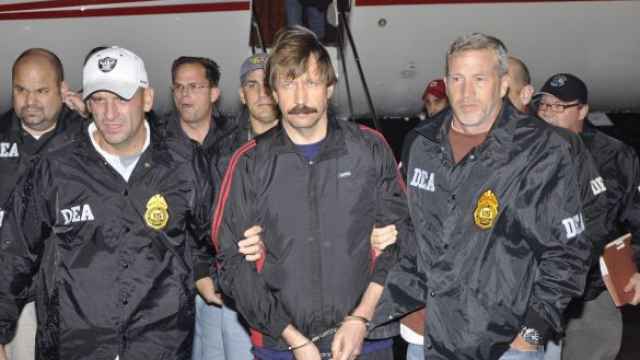An Israeli wanted in Colombia for training militias that killed hundreds returned home Saturday after he was released from a Moscow jail, disappointing activists and victims who have tried for years to bring him to justice.
Yair Klein is accused of training far-right paramilitary groups in the 1980s that stole land and murdered Colombians during a decade-long reign of terror across the countryside.
Klein appeared tired and defiant as he left the airport terminal in Israel early Saturday. He wore a khaki-colored sweater and beige pants and carried his own luggage. He told Israeli media that he missed women most of all during his stint behind bars.
At first he was hostile to the swarming reporters, then thanked them for assisting in his release. He also hinted at U.S. and Russian conspiracies.
Klein was arrested in August 2007 as he touched down in a Moscow airport. The Prosecutor General's Office attempted to extradite him to Colombia, but after years of litigation, it accepted a nonbinding ruling by the European Court of Human Rights in April that said Klein should not be extradited out of concerns that he would not receive a fair trial.
Klein spoke briefly to Israel's Channel 2 television outside the prison in Moscow, saying Russia had arrested him without a valid legal reason as he arrived on a business trip. He said the Russians apparently hoped to strike a major arms deal with Colombia and wanted to please its government by handing him over.
"I was arrested in order to blackmail me and do some kind of deal with Colombia," he said, speaking in Hebrew. "All of a sudden I became a bargaining chip."
Klein complained about harsh prison conditions and said his hand had become paralyzed because of nerve damage. He blasted the Israeli authorities for failing to help get him out.
"Now I need to start making a living from scratch," Klein said, adding that he plans to publish two books that "will cause chaos in Israel."
Speaking about Klein's imminent return to Israel earlier this month, the country's foreign minister, Avigdor Liberman, said he was grateful for the “human act of good will.”
Klein's Israeli lawyer Mordechai Tzivin told the Jerusalem Post in September that Liberman had done “all he could” to return Klein to Israel.
Russia's decision to release Klein and send him to Israel shows that he was insignificant for national security, said Igor Korotchenko, an analyst with the Center for Analysis of International Arms Trade, a Moscow think tank.
“Russia's national interests come first, but it turned out that he was not interesting to the country because he wasn't a significant figure, like Viktor Bout,” Korotchenko said.
Bout, a suspected arms dealer, was extradited from Thailand to the United States despite Russia's objections on Tuesday. He is accused of attempting to kill U.S. citizens and arms trafficking.
Klein was convicted in Colombia of helping set up training camps to teach private armies working for drug lords Pablo Escobar and Gonzalo Rodriguez Gacha about explosives, car bombs and high-profile killings. The armies later morphed into Colombia's right-wing death squads.
Klein, a former lieutenant colonel in the Israeli army, appeared in a 1998 video used to train far-right squads.
In 1991, he was convicted of selling arms to Colombia's illegal groups and fined $13,400 by an Israeli court. He also spent 16 months in a Sierra Leone prison in 1999 for his role in a guns for blood diamonds deal.
In an interview with Caracol television conducted in Israel and broadcast in 2007, Klein denied ever working with the cocaine cartels, but confirmed that he did instruct the far-right death squads in how to combat the leftist insurgency.
He said he was originally hired — with the Colombian Defense Ministry's blessing — to organize security for the banana industry in the northern region of Uraba.
Many of his students went on to carry out some of Colombia's most brutal massacres.
Klein maintained, however, that "they were not trained to kill, only trained to defend themselves."
Ivan Cepeda, of the Bogota-based National Movement of Victims of State Crimes, described Klein's release as a painful blow.
"There are the many victims of the paramilitary groups who were trained by this man," he said. "It hurts, that after so many efforts, Yair Klein enjoys freedom."
Colombian officials said they would still try extradite the former Israeli military officer, who was sentenced in absentia in 2001 to almost 11 years jail. Israel, however, is not likely to agree to ship off one of its citizens to trial elsewhere.
Human rights activists are pleading with Israel to open an investigation into Klein's actions in the hopes that he could be tried locally.
"Israel should not be a safe haven for somebody who is implicated in atrocities in Colombia," said Jose-Miguel Vivanco of the New York-based Human Rights Watch.
(AP, MT)
A Message from The Moscow Times:
Dear readers,
We are facing unprecedented challenges. Russia's Prosecutor General's Office has designated The Moscow Times as an "undesirable" organization, criminalizing our work and putting our staff at risk of prosecution. This follows our earlier unjust labeling as a "foreign agent."
These actions are direct attempts to silence independent journalism in Russia. The authorities claim our work "discredits the decisions of the Russian leadership." We see things differently: we strive to provide accurate, unbiased reporting on Russia.
We, the journalists of The Moscow Times, refuse to be silenced. But to continue our work, we need your help.
Your support, no matter how small, makes a world of difference. If you can, please support us monthly starting from just $2. It's quick to set up, and every contribution makes a significant impact.
By supporting The Moscow Times, you're defending open, independent journalism in the face of repression. Thank you for standing with us.
Remind me later.






